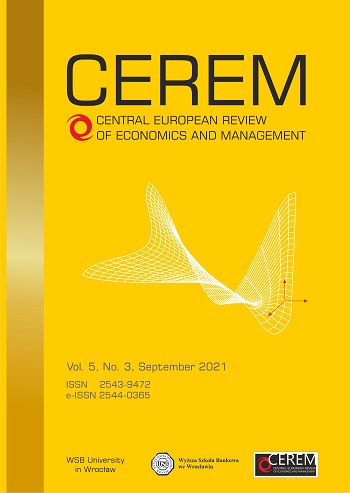Building certain knowledge based on the intentional-consequential gap in uncertain surroundings
DOI:
https://doi.org/10.29015/cerem.916Słowa kluczowe:
intention to consequence gap, knowledge, uncertainty, system approach, economic state, paradigm, research programme, game theory approachAbstrakt
Aim: Develop a methodological approach to reduce uncertainty of knowledge necessary for decision making in quick changing surroundings.
Research methods: The research method is heuristic supported by the research programme in Lakatos’ sense, specially designed for these purposes based on the good paradigm of minimization the intentional consequential gap (ICG).
Findings: The ICG is an interesting object related to the “is-ought problem” in Hume’s sense, representing the difference of resulting consequences and achievements of the intention after its realization. Any kind of minimization of the ICG may be recognized as a good paradigm in Kuhn’s sense suitable to build certain knowledge in the uncertain surroundings. So, it is the base of research programme in Lakatos’ sense which is a kind of filter for certain judgements about facts. It is crucial for decision making processes based on uncertain information and knowledge. In this paper a methodology of introduction the research programme based on the minimum ICG is presented.. Currently this method of inferring may be used for building the certain knowledge about rationality of decisions regarding dealing with COVID-19.
Value of the paper: The paper presents an original method of setting the criterion of rationality of any social projects and some axiological evaluations of, among other things, prognoses and strategies.
Bibliografia
Barnard C., Simon H.A. (1947), Administrative behavior. A study of decision-making processes in administrative organization, Macmillan, New York.
Bertalanffy L. von (1968), General system theory. Foundations, development, applications, Braziller, New York.
Black M. (1964), The gap between ‘is’ and ‘should’, “The Philosophical Review”, no. 73, pp. 165-181.
Book J., Bjørnskov C. (2021), Lockdowns don’t prevent coronavirus spread, AIER, Jan 12, https://www.aier.org/article/lockdowns-dont-prevent-coronavirus-spread/ [11.06.2021].
Burns T., Stalker G.M. (1961), The management of innovation, Tavistock, London.
Carnap R. (1995), An introduction to the philosophy of science”, Gardner M. (ed.), Dover Publications Inc., New York.
Gospodarek T. (2009a), Representative management as a rational research program in Kuhn-Lakatos-Laudan sense, “International Journal of Economics and Business Research”, vol. 1 no. 4, pp. 409-421.
Gospodarek T. (2009b), Modelowanie w naukach o zarządzaniu oparte na metodzie programów badawczych i formalizmie reprezentatywnym, Wydawnictwo Uniwersytetu Ekonomicznego we Wrocławiu, Wrocław.
Gospodarek T. (2012), Aspekty złożoności i filozofii nauki w teorii i praktyce zarządzania, Wydawnictwo WWSZiP, Wałbrzych.
Gospodarek T. (2015), Systemy ERP. Modelowanie, projektowanie, wdrażanie, Helion, Gliwice.
Gospodarek T. (2018), Biała księga zarządzania, Difin, Warszawa.
Kahneman D., Slovic P., Tversky A. (1982), Judgment under uncertainty. Heuristics and biases, Cambridge University Press, New York.
Kuhn T.S. (1970), The structure of scientific revolutions, 2nd ed., The University of Chicago Press, Chicago, London.
Lakatos I. (1978), The methodology of scientific research programmes, in: Philosophical papers, vol. 1, Worall J., Curie G. (eds.), Cambridge University Press, Cambridge, London.
Laudan L. (1983), The demise of the demarcation problem, in: Cohen R.S., Laudan L., Physics, philosophy and psychoanalysis. Essays in honor of Adolf Grünbaum, “Boston Studies in the Philosophy of Science”, vol. 76, pp. 111-127.
Popper K.R. (1934/1959), The logic of scientific discovery, Routlege, London, New York, https://books.google.pl/books?id=Yq6xeupNStMC&printsec=frontcover&redir_esc=y#v=onepage&q&f=false [11.06.2021].
Simon H.A. (1957), Administrative behavior, Free Press, New York.
Taleb N.N. (2007), The Black Swan. The impact of the highly improbable, Penguin, London.
Will M. (2020), The CoViD-19 pandemic and the end of corporate risk management as we know it, “Central European Review of Economics and Management”, vol. 4 no. 3, pp. 89-115.
Pobrania
Opublikowane
Numer
Dział
Licencja
Autor przenosi nieodpłatnie na Wyższą Szkołę Bankową we Wrocławiu , bez ograniczeń terytorialnych, majątkowe prawa autorskie do tego utworu w rozumieniu ustawy z dnia 4 lutego 1994 roku o prawie autorskim i prawach pokrewnych ( Dz.U. 1994, Nr 24, poz. 83 ze zm. )na zasadzie wyłączności, tj. prawo do:
a) wyłącznego używania i wykorzystania utworu w dowolnej działalności przez Wyższą Szkołę Bankową we Wrocławiu, w szczególności w działalność Biblioteki Cyfrowej uruchomionej przez Wyższą Szkołę Bankową we Wrocławiu
b) wytwarzania, utrwalania i zwielokrotniania egzemplarzy utworów wszelkimi technikami, w tym techniką drukarską, reprograficzną, zapisu magnetycznego oraz techniką cyfrową, w szczególności ich zwielokrotniania poprzez dokonywanie zapisów na płytach typu CD,
c) zamieszczenia wybranych fragmentów utworu w celach promocyjnych w publikacjach, materiałach promocyjnych, w sieci Internet oraz sieciach wewnętrznych typu Intranet Wyższej Szkoły Bankowej we Wrocławiu,
d) wprowadzania utworu do pamięci komputera Wyższej Szkoły Bankowej we Wrocławiu,
e) kopiowania i powielania utworu w technologiach fotomechanicznych lub innych znanych w dniu zawarcia umowy (fotokopie, kserokopie itp.),
f) przetworzenia dzieła na formę elektroniczną i nieograniczonego rozpowszechniania w sieci Internet.


